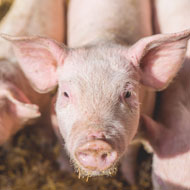Defra increases risk level for ASF

Veterinary surgeons and farmers in the UK are urged to remind themselves of the clinical signs of ASF.
The UK’s risk status for African swine fever has been raised from ‘very low’ to ‘low’, after the first outbreak in Romania and continuing cases in the Czech Republic and Poland.
Defra described these outbreaks as ‘concerning’ because they suggest ‘a spread in geographic distribution, a possible drop in biosecurity awareness and therefore an increase in the weight of infection in East Europe’.
There have been no recent consignments of live pigs from the Czech Republic or Romania to the UK, and the UK only imports a very small amount of pig products from these countries. However, Defra said there could be ‘substantial’ movement of people, vehicles and personal imports of pork products, which is why the UK’s risk level has been increased.
Veterinary surgeons and farmers in the UK are urged to remind themselves of the clinical signs of ASF, which may not be immediately obvious. Some disease reports suggest this virus appears to have reduced pathogenicity.
Pig keepers must ensure that pigs are not fed catering waste, kitchen scraps or pork products in general, which is illegal. Any clinical signs should be reported promptly to a veterinary surgeon and anybody returning from the affected EU member states is advised to avoid contact with pigs and wild boar until they are sure they have no contaminated clothing, footwear or equipment.
Romania reported its first ASF outbreak this week, on a small backyard farm containing four pigs. The outbreak occurred in Satu-Mare, Northern Romania, along the border with the Ukraine. A second outbreak was confirmed on a contact farm of three pigs on 1 August. Romanian authorities have said a possible source of infection is imported meat products from the Ukraine, but further epidemiological studies will be carried out.
There have now been 76 cases in the Czech Republic, according to Defra’s latest situation assessment. All outbreaks have occurred in the Zlin region, where control measures are in place. The disease is not currently present in areas with a high density of commercial pigs and there have been no reported cases in domestic pigs.
Czech authorities have announced plans to put a 45km electric fence around the infected area in Zlin, to contain wild boar.
Poland has reported six new cases in domestic pigs, of which four are in the Part I zone, which includes a commercial holding of 2,000 pigs. The outbreaks are said to be the result of poor on-farm biosecurity. Some have been attributed to shared grazing with cattle where wild boar have access.
The country has announced additional control measures on pig farms, such as keeping pigs separate from other livestock, controlling meat products in hand luggage and increased checks on main transport routes with Russia, Belarus and the Ukraine.
Eight new outbreaks were reported in backyard pig holdings in the Omsk region of East Russia. There has also been an increase in reported cases in wild boar in the Ukraine, near the border with Romania and Hungary. In response, Hungarian authorities have increased surveillance along the border with the Ukraine.
For further information visit: https://www.gov.uk/guidance/african-swine-fever



 The Animal and Plant Health Agency (APHA) has updated its online reporting service for dead wild birds.
The Animal and Plant Health Agency (APHA) has updated its online reporting service for dead wild birds.